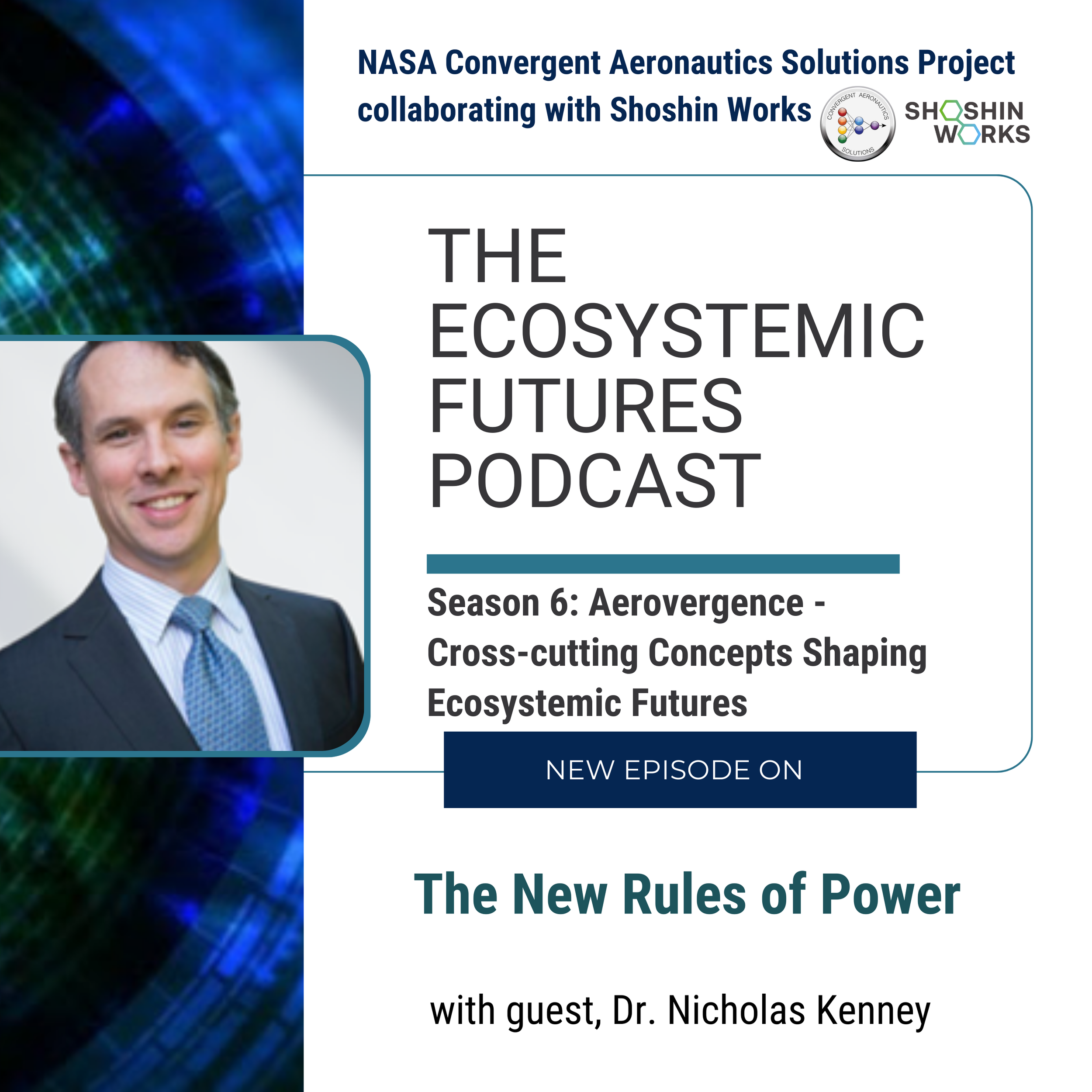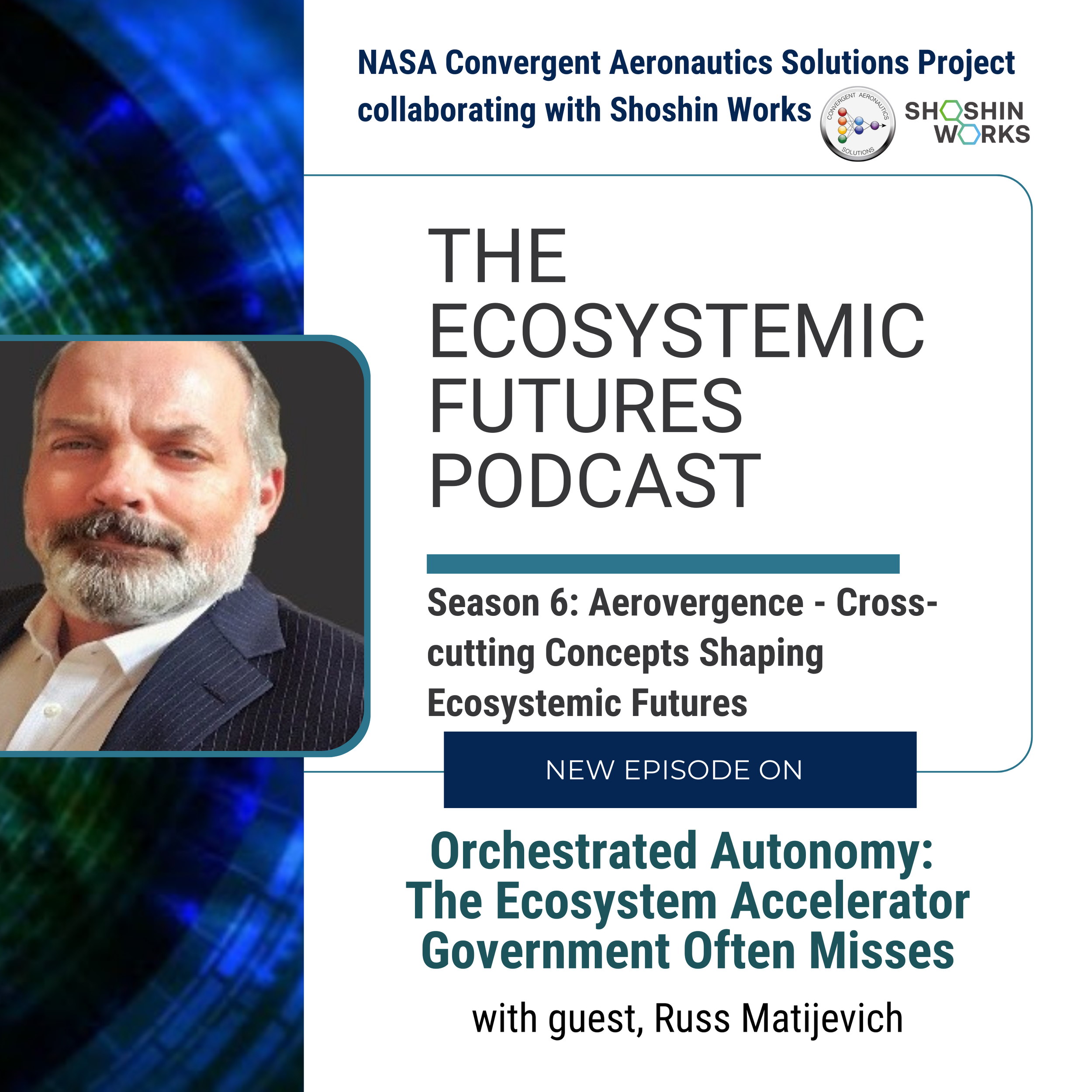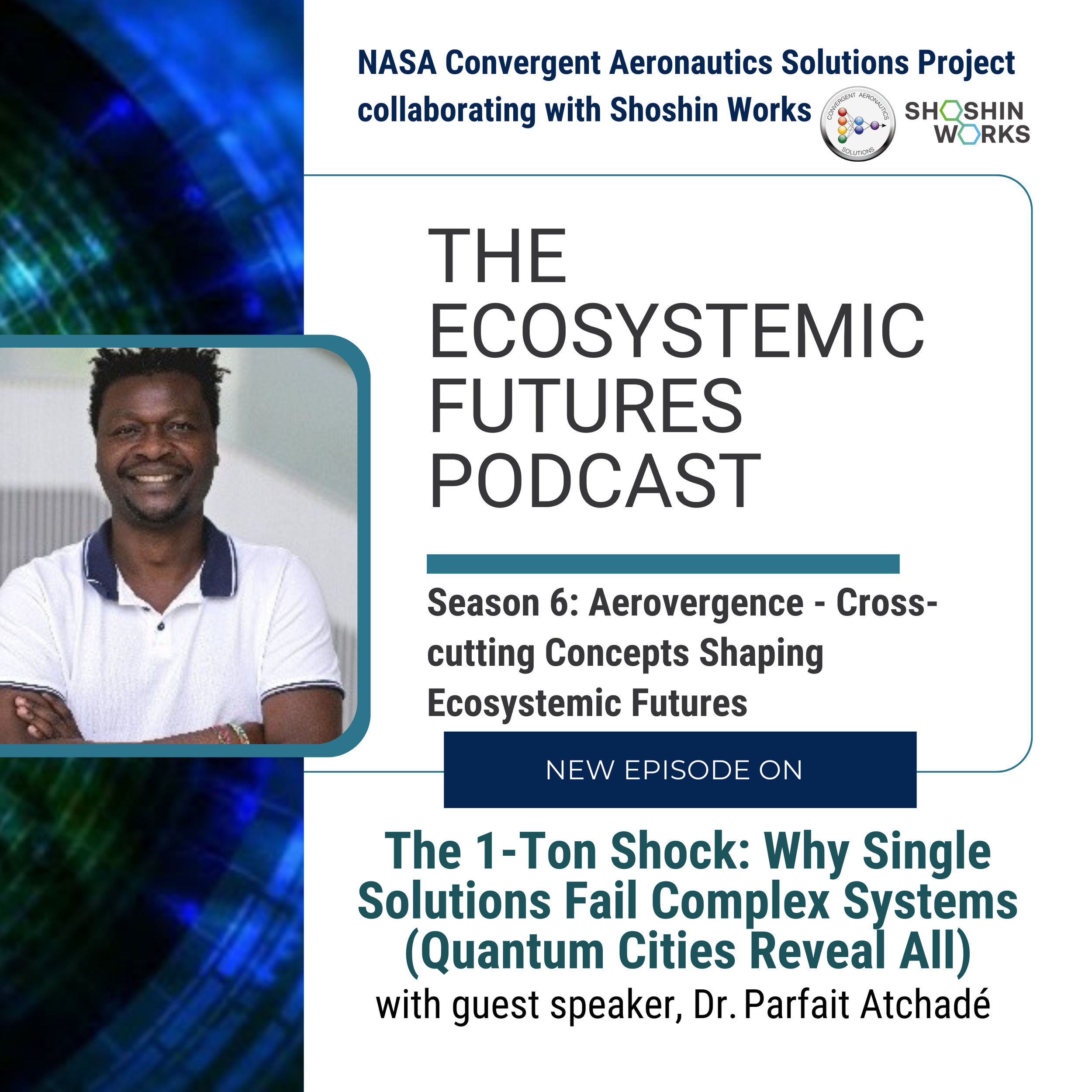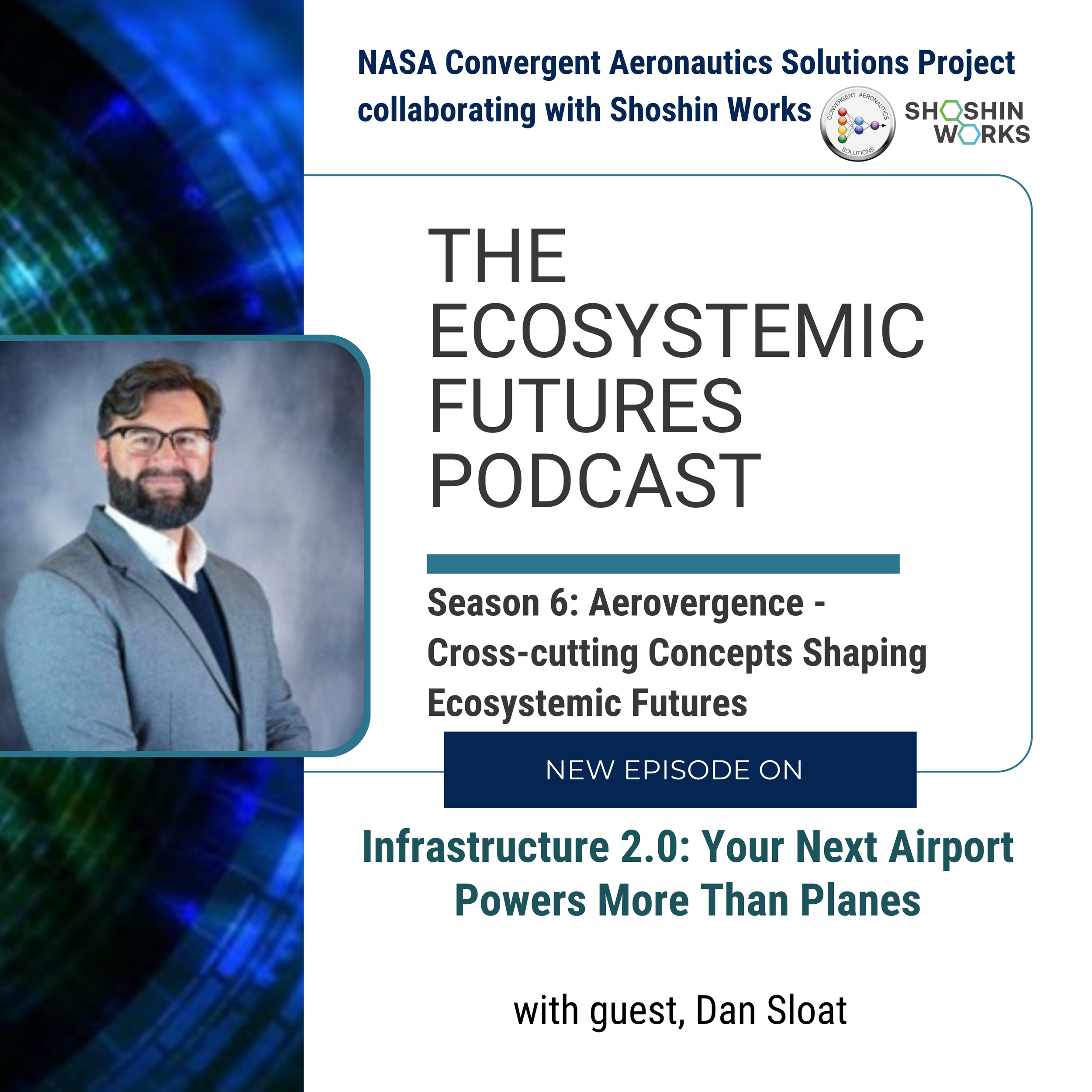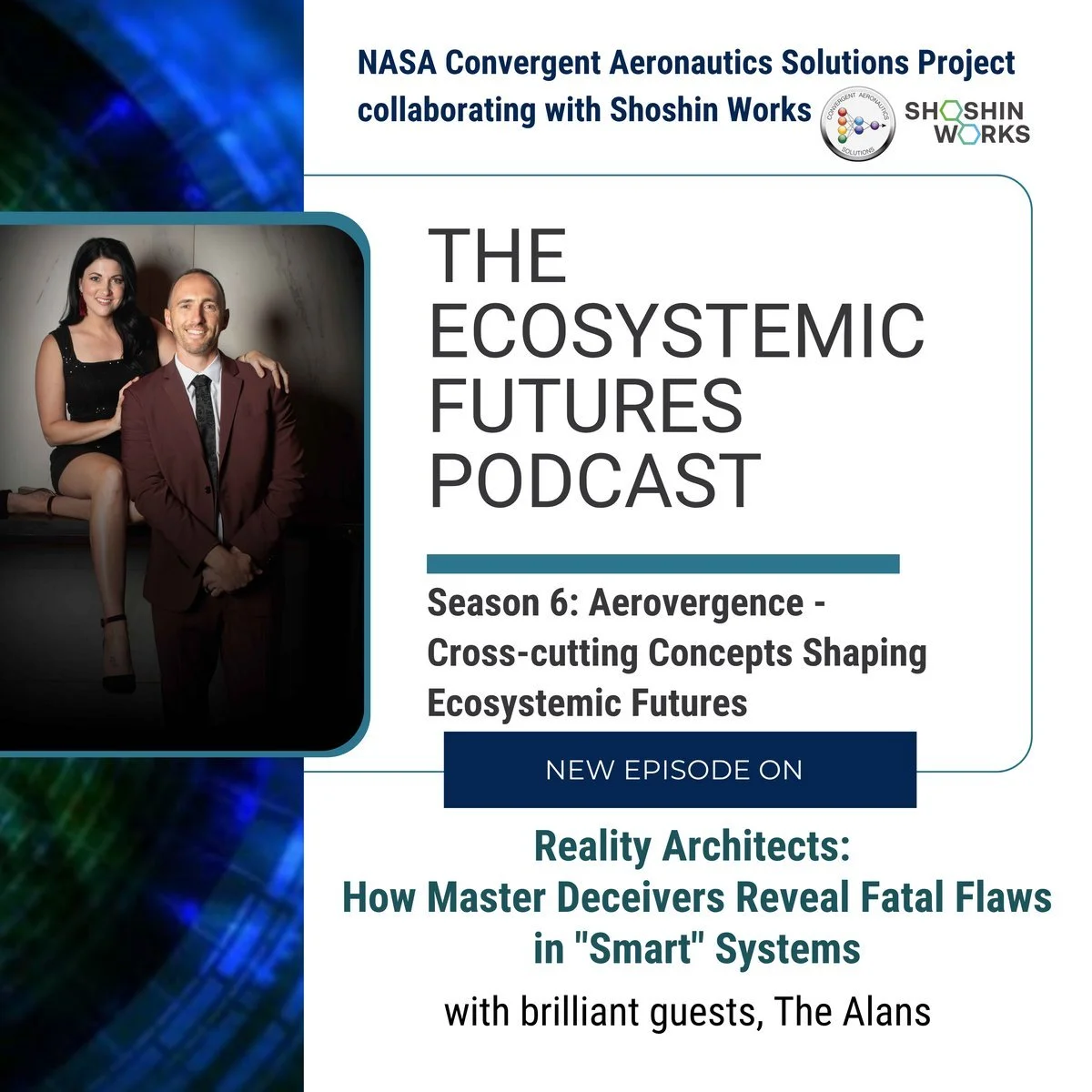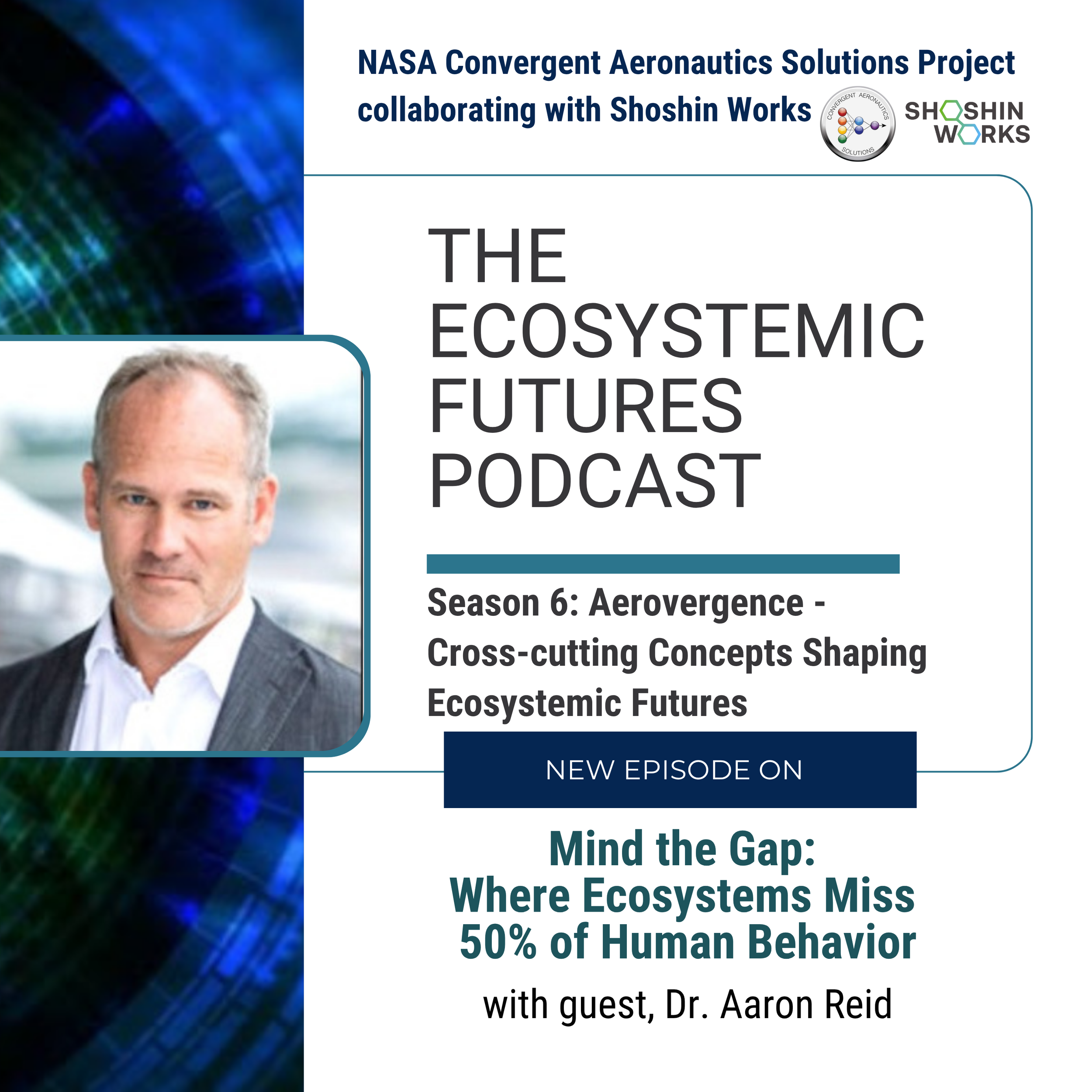
THE ECOSYSTEMIC FUTURES PODCAST
Dive deep with our hosts and distinguished guests from NASA and beyond, exploring the advancements in technology and science that are shaping new, ecosystemic models in industry, society, and policy.
Shaping our new economic engines.

Browse All Episodes
Catch the latest episode of the Ecosystemic Futures Podcast and join the ongoing conversation. While you're here, don't miss the opportunity to explore our thought leadership community
Many organizations get too big to succeed. Bahrain is small enough to call the minister and align an ecosystem over coffee. That's not a limitation—it's infrastructure. Leena Faraj spent a decade proving that relationship density beats bureaucratic scale.
Last week's whitepaper isn't production-ready. But someone's already pitching it to your board. Kence Anderson has deployed 100+ autonomous AI systems for Fortune 500 companies—and watched venture capital create a research-to-PR pipeline that skips development entirely. The 'D' in R&D got deleted. Hype cycles got amplified.
Last year's Chemistry Nobel went to non-chemists. The lasting power of purely domain-specific credentials is collapsing - but David Julian has seen this pattern before across four technological revolutions and knows what compounds instead.
Operators with 30 years of pattern recognition leave for competitors. Engineers carrying legacy system intelligence depart. Everyone understands the risk. Few solve execution: systematically extracting tacit intelligence that experts can't articulate because it operates below the conscious threshold.
Hydrogen infrastructure requires billion-dollar cryogenic systems. That's the conventional wisdom keeping hydrogen grounded. Dr. Jalaal Hayes proved it's wrong—and the implications for expeditionary operations are immediate.
The most transformative leaders understand that building ever-larger organizational infrastructure is counterproductive. Instead, they leverage resources and achieve impact by engineering robust, trust-based networks.
Information management delivers data. Knowledge management unleashes organizational intelligence - transforming how multi-stakeholder ecosystems coordinate, decide, and optimize performance across dynamic and complex networks.
Mission functions as a powerful organizing principle in market-based ecosystems. Faisal Hoque, a three-time Deloitte Fast 50 winner and transformation partner to DoD and CACI, reveals how architecting purpose into systematic structures creates a gravitational pull, drawing diverse actors into a coordinated flow. Key insight: exemplary architecture doesn't constrain innovation - it releases latent organizational potential into directed motion.
Traditional centralized control is obsolete. When dynamic markets and autonomous systems generate orders of magnitude more data than they can transmit, intelligence must live at the edge - and this constraint is revolutionizing everything from spacecraft to supply chains to healthcare.
What if we could measure adaptive capacity with the same precision we apply to engineering rocket systems?
Dr. Irena Chaushevska Danilovska reveals how neuroscience capabilities integrate with distributed innovation ecosystems to create a mission assurance architecture for organizations seeking resilience in dynamic environments.
Carol Erikson reveals the breakthrough: applying aerospace systems engineering to organizational transformation unlocks exponential gains in speed, cost, and effectiveness.
Gravity isn't just a physical force—it's an economic barrier costing America trillions in unrealized breakthroughs across semiconductors, pharmaceuticals, and defense technologies.
Traditional geopolitical analysis is dead. A $10,000 drone can now destroy a $100 million military platform—and this "budgetary exhaustion" strategy is already transforming how smart companies compete. We need systems thinking to navigate the four forces reshaping global power: balance of power, technology, climate change, and the nature of warfare.
The Apollo Program achieved humanity's most significant technological leap through "orchestrated autonomy”, a hidden methodology for ecosystem velocity and optimization that modern government partnerships miss. Breakthrough insight? True innovation requires autonomous components working independently first, then strategic orchestration second.
The revelation that shattered systems thinking: Replacing every combustion car with electric vehicles improves urban efficiency by only 6%—revealing why isolated optimizations fail in complex ecosystems.
Transportation infrastructure is about to flip inside-out. The revelation? Advanced Air Mobility isn't just creating flying cars—it's concurrently addressing energy opportunities by transforming airports from power consumers into community power providers.
Harvard scientists fell for table-flipping séances while 8-year-olds saw through million-dollar magic tricks. The revelation? Your most intelligent people systematically miss the most obvious solutions and risks —and this expertise blind spot risks limiting every "intelligent" system we build.
While ecosystem architects optimize for logical decision-making, they overlook the implicit forces that drive actual stakeholder behavior. Dr. Aaron Reid, founder of Sentient Decision Science, reveals a mathematical breakthrough: systems that incorporate both conscious reasoning and unconscious emotional drivers achieve 94% behavioral prediction accuracy, compared to 50-60% for traditional rational-actor models.
Woodpeckers don't have super-strong skulls that absorb 1,200 G-forces—they have interconnected geometric features that fragment and redirect energy, so the brain never experiences the full impact. Alain Bujold, a visionary R&D expert with 27 years of experience leading over 140 projects and holding 18 patents, reveals how ecosystemic thinking transforms protection.
Textile innovators shatter assumptions—strategic design choices create immediate circular economics. Dr. Rawaa Ammar, Chief Sustainability & Impact Officer at Resortecs, reveals a counterintuitive reality: While companies optimize in isolation, the industry collectively discards $500 billion in materials (equivalent to one garbage truck of textiles every second). Ecosystemic design captures 85-90% through active disassembly—but only when entire value chains collaborate.
Global consensus is the enemy of market efficiency. The solution lies in interconnected market ecosystems that work, while others debate.
Many business leaders assume that global alignment is necessary first, followed by implementation. But ASEAN is proving the opposite—regional market ecosystems can out-innovate global bureaucracy. Dr. Renard Siew, President of the Malaysia Carbon Market Association, breaks down the economics: Compliance-integrated exchange markets trade $200-300 billion annually, while voluntary efficiency trading platforms remain at $2 billion.
Denise Hatzidakis reveals healthcare's core dysfunction: providers make money when patients are sick, not when they are healthy. A 96-year-old cancer patient gets expensive chemotherapy (generating revenue from procedures + side effects) instead of appropriate palliative care—because the system rewards treatment, not outcomes.
How do you ensure humanity thrives when traditional agriculture faces supply chain disruptions and geographic constraints?
Most food security solutions focus on single variables, such as increasing yield, improving efficiency, or reducing costs. However, as global populations urbanize and supply chains become increasingly complex, we need ecosystem-based solutions that work both on Earth and beyond.
How do you build the future when no blueprint exists?
Most breakthrough technologies fail not because of technical limitations, but because we try to solve them sequentially: we develop the technology first, then figure out the regulation, then build the infrastructure, and then train the people.
NEOMis rewriting this playbook entirely.
In 2023, they conducted Saudi Arabia's first eVTOL flight in conditions that would challenge the certification considerations of any aviation authority—50°C+ desert heat, dust storms, and coastal corrosion that would ground conventional aircraft.
As AI systems approach and potentially surpass human cognitive benchmarks, how do we design hybrid intelligence frameworks that preserve human agency while leveraging artificial cognitive enhancements?
In this exploration of human-AI convergence, anthropologist and organizational learning expert Dr. Lollie Mancey presents a framework for the "cognitive revolution,” the fourth transformational shift in human civilization following agricultural, industrial, and digital eras.
FROM SILOS TO ECOSYSTEMS: The $13 trillion construction industry is experiencing its first systemic transformation in decades.
In this groundbreaking episode, we explore how advanced technologies are breaking down the silos that have confined the construction industry to decades of declining productivity. Francesco "Frio" Iorio, CEO of Augmenta and pioneer of generative design, reveals how construction is transforming from a fragmented collection of isolated specialists into an integrated ecosystem of collaborative intelligence.
How can higher education cultivate versatile, adaptable graduates prepared to navigate the increasingly complex systems of our technological world?
In this episode of Ecosystemic Futures, we engage with Dr. Lisa Kahle-Piasecki, whose expertise spans business education, workforce development, and technological innovation. The conversation explores how Heidelberg University, a 175-year-old institution with just over 1,000 students, creates Renaissance-style graduates with resilient competency portfolios through international collaboration, community problem-solving, and ethical technology integration. Dr. Kahle-Piasecki shares insights about developing students who can thrive across disciplines, cultures, and career transitions while addressing complex systemic challenges.
In this illuminating episode of Ecosystemic Futures, host Marco Annunziata engages with Robin Hutcheson, whose multifaceted expertise spans the complex urban transportation ecosystem. The conversation explores how cities generate more than 80% of global GDP despite occupying limited physical space, and function as dynamic testbeds for next-generation mobility systems. Drawing from her leadership roles at USDOT, FMCSA, and city transportation departments, Robin shares data-driven insights about the 43,000 annual highway fatalities in America and the disproportionate impact on pedestrians.
How do boundary zones fuel innovation breakthroughs in complex organizations?
Join host Marco Annunziata as he welcomes Jaspar Roos, a member of the European Commission's OISP innovation group and founding partner of the Human and Tech Institute. With MIT credentials in AI Strategy and implementation experience with ISO56001 innovation frameworks, Jaspar examines how ecosystemic models are reshaping societal governance and network orchestration systems.
This conversation explores how 80% of employees, typically outside headquarters, remain disconnected from innovation initiatives, despite organizations investing heavily in AI and digital transformation. Jaspar presents neuroscientific evidence on how the "water cooler effect" creates cognitive transformation: when employees step away from structured work environments, dopamine release facilitates relaxation, leading to the serendipitous interactions that drive breakthrough thinking.
How might understanding the interconnected nature of quantum physics, consciousness, and anomalous phenomena transform our approach to ecosystemic innovation?
This episode of Ecosystemic Futures explores how seemingly disparate knowledge systems—quantum physics, religious phenomena, and UAP research—form an interconnected knowledge ecosystem. Dr. Hal Puthoff, Dr. Diana Pasulka, and John von Blauch join hosts Dyan Finkhousen and Anna Brady-Estevez to reveal how our compartmentalized approach to knowledge has limited our understanding of complex phenomena that transcend traditional boundaries. The conversation examines how space-time metric engineering and quantum entanglement could provide frameworks for understanding historical anomalies and future technological development.
Delve Deeper with Shoshin Works’ Speaker Series
If you enjoyed our podcast, take the next step with our exclusive, invitation-only speaker events. Join insightful conversations with industry experts and thought leaders as we explore the cutting-edge trends and innovations driving the future of ecosystemic resilience.
DRIVE FUTURE-READY SUCCESS WITH SHOSHIN WORKS
Redefine the landscape of your organization's performance with our digitally-enabled solutions. Together, we'll unlock new levels of agility and growth for your enterprise.













